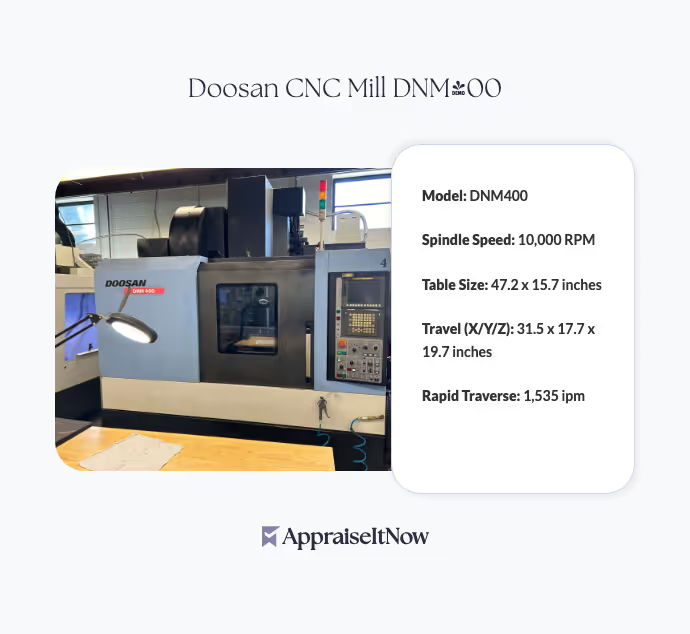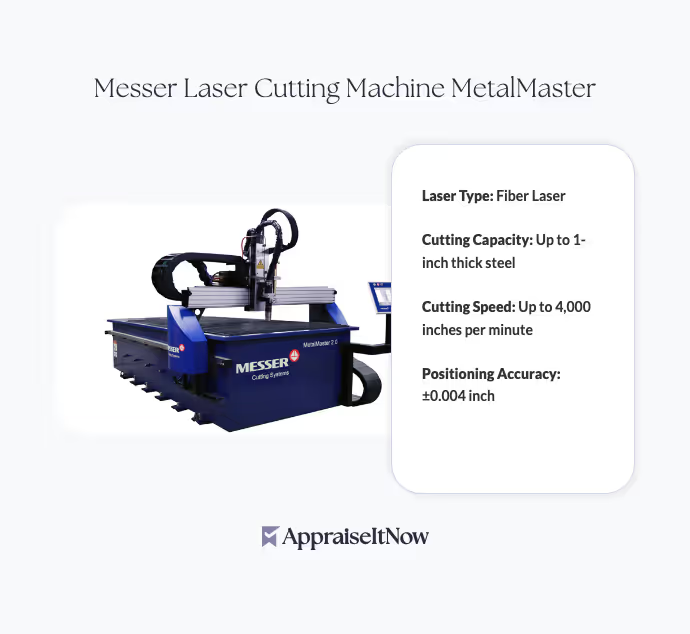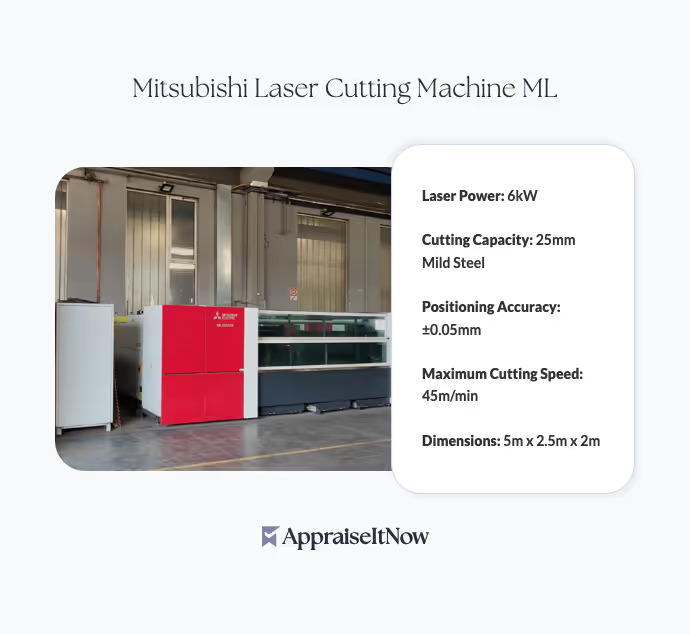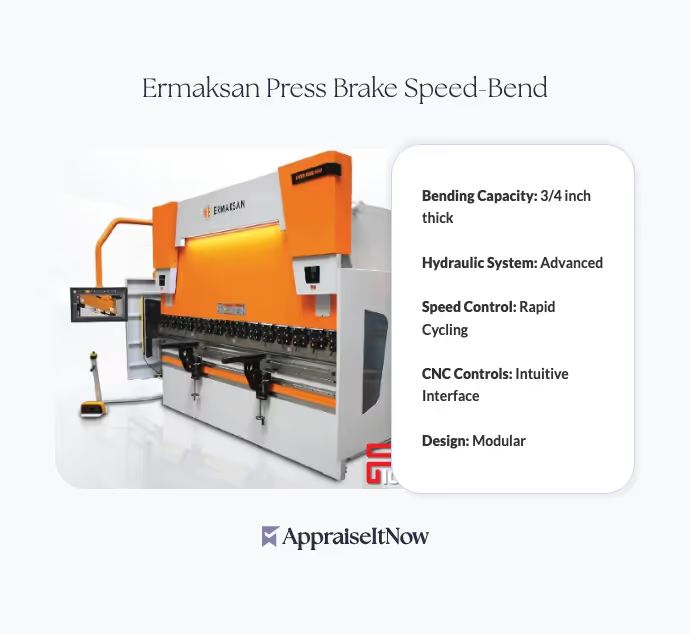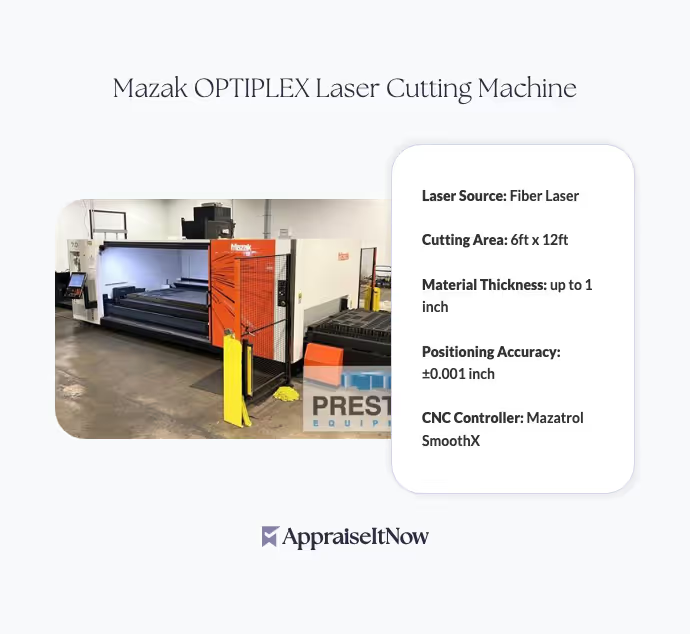<h1>How to Get Your Doosan CNC Mill DNM400 Appraised</h1>
<p>The Doosan CNC Mill DNM400 represents a significant industrial asset, with current market values ranging from <strong>$85,000 to $105,000</strong> depending on condition, operational hours, and maintenance history. Whether you're planning to sell, refinance equipment, manage your business assets, or handle an estate, obtaining a professional appraisal provides essential documentation and accurate valuation that protects your interests.</p>
<h2>Understanding Your DNM400's Market Position</h2>
<p>The Doosan DNM400 has established itself as a workhorse in precision manufacturing since its introduction in 2005. This 5-axis CNC milling machine combines robust construction with advanced thermal compensation technology, making it particularly valuable across aerospace, automotive, and general manufacturing sectors. Understanding what positions your specific DNM400 within the broader <strong>$85,000–$105,000</strong> range requires examining several operational and market factors.</p>
<p>Your DNM400's powerful 10,000 RPM spindle and rapid traverse speeds up to 1,535 ipm enable complex part production that smaller mills cannot handle. The machine's large work envelope and precision capabilities mean it likely commands attention from manufacturers looking to acquire established equipment rather than purchase new. This secondary market demand directly supports the valuation range, though individual machines vary significantly based on their operational history.</p>
<div class="callout tip"><p><strong>Market Insight</strong></p>
<p>Doosan DNM400 mills produced in the first decade (2005–2015) often carry stronger valuations due to proven track records and parts availability, while later models may reflect depreciation or premium for lower hours.</p></div>
<h2>Key Factors That Influence Your DNM400's Appraised Value</h2>
<p>When professional appraisers evaluate your CNC mill, they assess multiple dimensions beyond the model name and age. The spread between $85,000 and the $105,000 ceiling typically reflects these primary value drivers.</p>
<p><strong>Machine hours</strong> rank as the most significant value determinant. A DNM400 with 5,000 operating hours sits substantially higher than one with 15,000 hours, as spindle wear, thermal compensation calibration drift, and general mechanical fatigue accumulate predictably over time. Appraisers typically expect approximately 2,000–3,000 annual operating hours for a machine in active production; machines significantly above or below this baseline raise questions about utilization or potential maintenance issues.</p>
<p><strong>Maintenance documentation</strong> directly impacts appraisal outcomes. Machines with complete service records showing regular spindle maintenance, ballscrew lubrication, and thermal compensation verification command 15–25% premiums over undocumented equipment. Your ability to provide maintenance logs, replacement parts invoices, and service dates transforms an "unknown condition" asset into a "well-maintained" asset with corresponding value increases.</p>
<p><strong>Controller specifications and upgrades</strong> affect functionality and market appeal. Original Doosan controllers integrate seamlessly with the DNM400's architecture, while retrofitted or third-party control systems may reduce desirability despite potentially adding functionality. Appraisers evaluate whether any CNC program backups or software licenses transfer with the machine, as these directly enable buyers to deploy the equipment immediately.</p>
<p><strong>Tooling, fixtures, and accessories</strong> add measurable value to your appraisal. Standard collet holders, vises, and clamps often increase total equipment value by 10–15%, while specialized fixtures built for specific production runs may add value only if documentation demonstrates their versatility or the fixtures' cost to replace. Professional appraisers separately itemize these components to clearly communicate additional value beyond the base machine.</p>
<h2>Remote Photo Review vs. On-Site Inspection: What Appraisers Need</h2>
<p>When evaluating your Doosan DNM400, appraisers choose between remote photo-based assessment and on-site physical inspection depending on several factors. Each approach has distinct advantages for valuation accuracy and documentation quality.</p>
<p><strong>Remote photo reviews</strong> work well for preliminary valuations or machines where travel logistics present challenges. High-resolution images of the spindle area, ballscrew condition, thermal compensation system, and controller display provide sufficient visual data to identify obvious wear patterns, corrosion, or damage. However, remote assessment cannot fully evaluate spindle runout, thermal compensation accuracy, or mechanical responsiveness—factors that influence fair market value.</p>
<p><strong>On-site inspections</strong> represent the professional standard for comprehensive machinery appraisals, particularly when equipment exceeds $100,000 in value. During site visits, certified appraisers operate the machine through its range of motion, verify spindle performance at various RPM levels, assess thermal stability, and document physical condition with detailed photography. This hands-on evaluation typically costs more but generates more defensible valuations for insurance, litigation, or significant transactions.</p>
<div class="callout note"><p><strong>Appraisal Standard</strong></p>
<p>USPAP-compliant appraisals of <a href="/blog/appraising-industrial-equipment-assessing-machinery-and-manufacturing-assets">industrial equipment</a> typically require on-site inspection when appraisal value exceeds $50,000 or when accuracy directly impacts business decisions.</p></div>
<h2>Essential Documentation for Accurate Valuation</h2>
<p>To expedite your DNM400 appraisal and ensure maximum accuracy, compile specific documentation before meeting with appraisers. This information directly influences both valuation precision and the speed at which professionals can complete their assessment.</p>
<p><strong>Serial number and specifications</strong> form the foundation of any machinery appraisal. Your DNM400's serial number connects to Doosan's production records, verifying manufacture date, original specifications, and any factory recalls or known issues. Original equipment documentation—whether printed manuals or digital files—helps appraisers confirm your machine's exact configuration and identify any non-standard modifications.</p>
<p><strong>Maintenance and service records</strong> represent perhaps the most valuable documentation you can provide. Invoices showing spindle rebuilds, ballscrew replacement, controller firmware updates, and routine servicing demonstrate commitment to equipment preservation. Appraisers often increase valuations by 10–20% when presented with comprehensive maintenance histories, as they reduce uncertainty about hidden wear or deferred maintenance issues.</p>
<p><strong>CNC program backups and software licensing</strong> documentation adds practical value for potential buyers. If your organization maintains digital archives of programs run on the DNM400, documentation that these transfer with the machine can increase appraised value. Similarly, clarifying whether Doosan software licenses remain valid for new ownership eliminates barriers to equipment deployment post-sale.</p>
<p><strong>Photographs from multiple angles</strong> supplement professional appraisal inspection. Before inviting appraisers for on-site evaluation, capture clear images of the spindle area, thermal compensation system, controller display, ballscrew condition, and any visible wear patterns. These photos allow appraisers to prepare for the inspection and identify areas requiring focused attention during physical assessment.</p>
<h2>Valuation Applications: Insurance, Financing, Tax, and Legal</h2>
<p>Professional Doosan DNM400 appraisals serve multiple purposes beyond simple curiosity about asset value. Understanding your intended use helps appraisers tailor their approach and documentation to meet specific regulatory or institutional requirements.</p>
<p><strong>Insurance coverage</strong> represents the most common appraisal application for manufacturing equipment. Insurers require documented replacement cost valuations to establish appropriate coverage limits; underinsured equipment leaves you exposed to significant loss if damage or theft occurs. A certified DNM400 appraisal, updated annually to reflect market changes and accumulated operating hours, ensures your business maintains proper coverage without overpaying for excessive limits.</p>
<p><strong>Equipment financing</strong> often requires independent appraisals as part of lender due diligence. Banks and specialized equipment finance companies need verified fair market value documentation to establish collateral coverage; your appraisal demonstrates that the DNM400 justifies the loan amount. This is particularly relevant if you're using existing <a href="/types/equipment-and-machinery">equipment and machinery</a> as collateral for expansion or other business financing.</p>
<p><strong>Tax and accounting purposes</strong> require USPAP-compliant appraisals when reporting asset values for tax deductions, charitable donations, or financial reporting. If your organization is donating the DNM400 to a technical school or training program, the IRS requires an independent appraisal to validate the charitable deduction amount. Similarly, estate planning that includes manufacturing equipment necessitates professional valuations to ensure equitable asset distribution among beneficiaries.</p>
<p><strong>Legal disputes and litigation</strong> involving equipment valuation, insurance claims, or partnership dissolution frequently rely on certified appraisals as expert testimony. Courts prefer appraisals conducted by credentialed professionals using documented methodologies, making USPAP compliance essential when appraisals may eventually support legal proceedings.</p>
<h2>Repair and Reconditioning: What Appraisers Consider</h2>
<p>An important but often overlooked aspect of CNC mill appraisal involves identifying necessary repairs and reconditioning costs that influence fair market value. Professional appraisers evaluate your DNM400 not just for its current condition but also for what repairs a prudent buyer would reasonably expect to perform.</p>
<p><strong>Spindle reconditioning</strong> represents the most common expense potential buyers anticipate. Spindles typically require rebuilding after 10,000–15,000 operating hours, involving bearing replacement, rotor/stator inspection, and thermal balance verification. Appraisers factor these predictable maintenance costs into valuations; a machine with 14,000 hours may see a $5,000–$8,000 valuation reduction reflecting anticipated spindle work.</p>
<p><strong>Ballscrew and linear guide replacement</strong> costs factor into longer-term valuation assessments. While not immediately necessary, machines with high operating hours may need ballscrew replacement ($3,000–$5,000) or linear bearing upgrades within the next 2,000–3,000 hours. Appraisers adjust values accordingly, though documenting that you've recently replaced these components protects your valuation.</p>
<p><strong>Controller and CNC system updates</strong> sometimes represent necessary reconditioning expenses. While Doosan controllers typically age well, parameter files may require recalibration, and older models may benefit from firmware updates. Appraisers estimate these costs and factor them into overall valuations, though they're generally modest ($500–$2,000) compared to mechanical system rebuilds.</p>
<div class="callout tip"><p><strong>Value Preservation</strong></p>
<p>Addressing known repair needs before appraisal often pays dividends; a $3,000 spindle service investment can recover $4,000–$6,000 in appraised value by converting "deferred maintenance" to "recently serviced" status.</p></div>
<h2>Market Conditions and Regional Demand</h2>
<p>Your Doosan DNM400's appraised value fluctuates based on broader manufacturing sector conditions and regional equipment demand. Understanding these market dynamics helps explain valuation variations and clarifies why your machine might achieve different prices in different markets.</p>
<p><strong>Regional manufacturing concentration</strong> significantly impacts DNM400 demand and pricing. Areas with active aerospace, automotive, or medical device manufacturing typically support stronger equipment valuations due to local buyer competition. Conversely, regions with declining manufacturing capacity may see similar machines valued at the lower end of the $85,000–$105,000 range.</p>
<p><strong>Sector-specific demand cycles</strong> affect valuations. When aerospace manufacturers expand capacity, DNM400s and similar precision mills experience heightened demand and improved valuations. Conversely, economic downturns or industry consolidation reduce demand and compress valuations toward the lower range.</p>
<p><strong>New equipment pricing and availability</strong> establish valuation ceilings. When new comparable CNC mills sell for $120,000–$140,000, used DNM400s with reasonable operating hours command premium secondary market prices. If manufacturers introduce significantly more capable machines at similar price points, used DNM400 valuations may compress as buyers shift preference to newer technology.</p>
<p>Your professional appraiser considers these broader <a href="/blog/how-do-market-conditions-and-regional-demand-affect-the-resale-value-of-a-doosan-dnm400">market conditions</a> and local demand indicators to position your specific machine appropriately within the valuation range, adjusting for conditions that may affect realistic selling prices in your geographic market.</p>
<h2>Maximizing Your DNM400's Appraised Value</h2>
<p>If you're preparing to have your Doosan CNC mill appraised, several preparation steps can positively influence the valuation and ensure appraisers have the information necessary to accurately assess your equipment.</p>
<p><strong>Cleaning and cosmetic presentation</strong> matter more than you might expect. While appraisers focus on mechanical condition, a clean machine with no fluid leaks or debris buildup creates confidence that you've maintained the equipment properly. Professional-grade cleaning doesn't change the underlying condition assessment but removes visual signals of neglect that might trigger more conservative valuations.</p>
<p><strong>Minor repairs and demonstrated functionality</strong> often provide excellent return on investment. If the coolant system has minor leaks, repairing them before appraisal is cost-effective since the fix costs $500–$1,000 but prevents $3,000–$5,000 valuation reductions. Running the machine through complete cycles and verifying all axes move smoothly demonstrates operational readiness that appraisers weight heavily in valuations.</p>
<p><strong>Organizing documentation</strong> dramatically improves appraisal efficiency and value. Providing maintenance records chronologically, original equipment manuals, recent service invoices, and CNC program examples signals that you've treated the DNM400 as a valued asset. Appraisers reward this evidence of proper stewardship with more favorable condition assessments and valuations.</p>
<div class="callout note"><p><strong>Preparation Impact</strong></p>
<p>Machines presented with complete documentation, recent servicing records, and demonstrated operational capability typically achieve appraisals 5–15% higher than identical machines presented without this context.</p></div>
<h2>Professional Appraisal Timelines and Costs</h2>
<p>Understanding typical timelines and investment requirements for Doosan DNM400 appraisals helps you plan appropriately, whether you're managing a transaction, securing financing, or updating insurance coverage.</p>
<p><strong>Appraisal turnaround typically ranges from 5–15 business days</strong> depending on whether the assessment includes remote photo review or on-site inspection. Simple preliminary valuations based on serial number, specifications, and condition photos may complete within 5–7 days. Comprehensive on-site inspections requiring appraiser travel, machine operation, and detailed documentation may require 10–15 days, though expedited services are available at premium rates.</p>
<p><strong>Costs generally range from $500 to $2,000</strong> depending on appraisal complexity, geographic location, and whether on-site inspection is required. Remote appraisals based on detailed photos and documentation typically cost $500–$1,000. On-site inspections with comprehensive testing, photography, and detailed USPAP-compliant reporting typically range $1,000–$2,000, with travel expenses potentially adding $200–$500 for distant locations. This investment typically represents less than 1–2% of your DNM400's appraised value, making it highly cost-effective for transactions or insurance purposes.</p>
<p>AppraiseItNow connects you with <a href="/types/metalworking-equipment">certified metalworking equipment appraisers</a> throughout the U.S., many credentialed through professional organizations like AAA, ISA, and ASA. Our experts provide transparent pricing, clear timelines, and USPAP-compliant documentation that stands up to professional scrutiny and regulatory requirements.</p>
<hr />
<div class="callout note"><p><strong>Key Takeaway</strong></p>
<p>A professional appraisal of your Doosan CNC Mill DNM400 provides the accurate, defensible valuation essential for insurance coverage, equipment financing, tax reporting, or informed selling decisions. By compiling maintenance documentation, scheduling on-site inspection when appropriate, and preparing your machine to demonstrate its operational condition, you maximize appraised value while gaining confidence that your assessment reflects fair market reality in today's manufacturing equipment market.</p></div>
